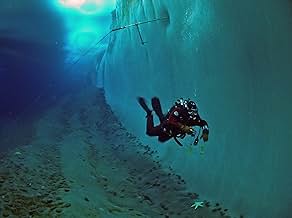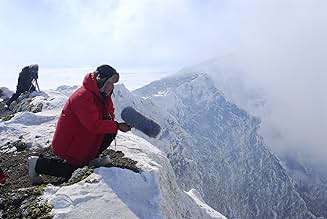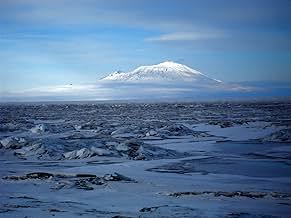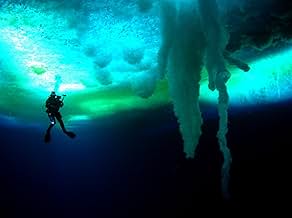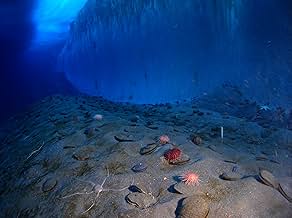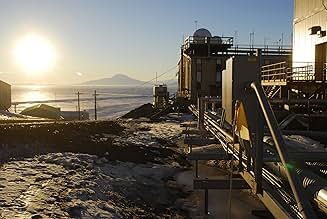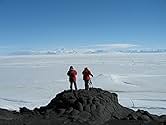Adicionar um enredo no seu idiomaFilm-maker Werner Herzog travels to the McMurdo Station in Antarctica, looking to capture the continent's beauty and investigate the characters living there.Film-maker Werner Herzog travels to the McMurdo Station in Antarctica, looking to capture the continent's beauty and investigate the characters living there.Film-maker Werner Herzog travels to the McMurdo Station in Antarctica, looking to capture the continent's beauty and investigate the characters living there.
- Indicado a 1 Oscar
- 2 vitórias e 16 indicações no total
- Self - Glaciologist
- (as Douglas MacAyeal)
- Self - Filmmaker, Cook
- (as Ryan A. Evans)
Avaliações em destaque
But, the film STILL is mesmerizing. You learn about the very unearthly sort of sounds the seals make under the ice, the sad story of a mixed-up penguin, some amazing volcano research and lots of odd facts about this MOSTLY desolate continent. Well worth seeing--just don't be too turned off by the occasionally bizarre dialog.
Interestingly, it seems that this is less by design than by accidents that occur because he chooses to put his camera in places where the cosmos is unstable. Sometimes it rewards deeply, because we find our own window into beautiful chaos. Sometimes the experiments fail, and you can see how he has tried to distract us with observations from himself rather than the world he has placed us in.
This is such a failure. He goes, enticed by the promise of cruel, unfathomable beauty. He finds no accident with inherent narrative, so he inserts his own. Unfortunately, Herzog the man and mind is the least interesting element of any Herzog film. I know I am in the minority here, because he has a celebrity persona.
But watch this, and see how he interviews his subjects. He is trying to cast them as beautiful souls doomed be a part of the ugliness of humanity. Some of the interviews are staged or rehearsed. He admits this. I know the words are genuinely from the people who speak them, but the narrative is false. Herzog has this notion — this essentially Austrian notion — that nature is only full when it is cruel, stark and dangerous. Humanity is unnatural; only a few butterfly souls escape, and they are to be cherished.
So look here: we have his usual Wagnerian chorus, using internationally fused sounds. We have some nature, always presented as cosmically unfriendly. We have episodes that underscore the hopeless weakness of society. And we have characters that engage and inspire. But it all seems so desperately constructed here. Whether he likes it or not, he has simply made a penguin film, but with humans.
Ted's Evaluation -- 2 of 3: Has some interesting elements.
It focuses predominantly on the odd collection of people drawn to live in an Antarctic research station, and to a slightly lesser degree on the oddness of the region itself, and the bizarre bits of scientific trivia that can be found there. Then there the bonus meanderings about the ultimate doom of humanity and whether we originally emerged from the sea onto land to escape the "horror" of marine ecosystems.
Many of its parts are fascinating, but for me, it didn't quite come together as a whole. It drifted in a lot of different directions, but seemed overall to be lacking in focus a bit. There were also a couple of elements that disturbed me a little - one was the inconsistency of talking about how humanity is destroying itself one moment, and then bashing "tree huggers and whale huggers" the next. I guess it's OK to notice that we're damaging the world, but not to try and do something about it? The other was that in some cases he seemed to be going out of his way to depict the people he interviewed in embarrassing ways, with things like leaving the camera lingering on them after the interview appeared to be finished, as they stood nervously, apparently trying to figure out if it was over or not.
But on the whole I would recommend it -- the flaws are offset by some impressive visuals (especially the underwater footage), dry humour, interesting ideas to ponder, and a really great soundtrack by Henry Kaiser and David Lindley, which work very well with the oddness of the content.
My complaints are essentially twofold. First, the movie is disjointed. It is a hodgepodge of Herzog's encounters with various Antarctic researchers and residents; there is no apparent order or theme. This is a minor criticism, as most of the segments make for fine viewing on their own, but it would have been more satisfying if Herzog had presented a unifying thesis or two about the Light Continent (aside from the oft-repeated observation that it is populated by a fair number of "professional dreamers"). He should have at least arranged the segments in a clearly meaningful sequence. At its best, the film made no more of an impression on me than "that was beautiful," "that was cool," or "I didn't know that." Second, and more significantly, Herzog's narration is at times irritating. As someone who has studied climate change, I share his frustration and pessimism. But there is no call for saddling the film's final moments with apocalyptic platitudes (e.g., "the end of human life is assured") and a cursory reference to global warming. These sentiments are incongruous with the rest of the film, which does not substantially address environmentalism and whose most haunting scene is of a mad penguin that abandons its flock and runs inland towards distant mountains, to certain death, with a singular determination. Herzog's doomsayings, in any event, are better communicated by the satellite images of rapidly melting polar ice that we observe on a climatologist's computer screen. I know that Herzog is capable of more measured reflections on the impersonal and uncontrollable power of nature; for example, from Grizzly Man: "what haunts me is that in all the faces of all the bears that Treadwell ever filmed, I discover no kinship, no understanding, no mercy. I see only the overwhelming indifference of nature. To me, there is no such thing as a secret world of the bears. And this blank stare speaks only of a half-bored interest in food. But for Timothy Treadwell, this bear was a friend, a savior." In Encounters, Herzog superficially and self-indulgently overstates his case. I'm looking forward to his next film.
Você sabia?
- CuriosidadesWerner Herzog dedicated the film to Roger Ebert, who he calls a true "warrior of cinema". Due to the dedication Ebert could not review the film, but he wrote a complimentary letter to Herzog and later published it.
- Citações
[last lines]
Stefan Pashov: There is a beautiful saying by an American philosopher, Alan Watts. He used to say that through our eyes the universe is perceiving itself, and through our ears the universe is listening to its cosmic harmonies. And we are the witness to which the universe becomes conscious of its glory, of its magnificence.
- ConexõesEdited from O Mundo em Perigo (1954)
- Trilhas sonorasPlanino Stara Planino Mari
Written by Stefan Dragostinov
Performed by The Philip Koutev National Folk Ensemble
Principais escolhas
- How long is Encounters at the End of the World?Fornecido pela Alexa
Detalhes
- Data de lançamento
- País de origem
- Central de atendimento oficial
- Idiomas
- Também conhecido como
- Encounters at the End of the World
- Locações de filme
- Empresas de produção
- Consulte mais créditos da empresa na IMDbPro
Bilheteria
- Faturamento bruto nos EUA e Canadá
- US$ 944.933
- Fim de semana de estreia nos EUA e Canadá
- US$ 17.730
- 15 de jun. de 2008
- Faturamento bruto mundial
- US$ 1.205.464
- Tempo de duração
- 1 h 39 min(99 min)
- Cor
- Mixagem de som
- Proporção
- 1.78 : 1







